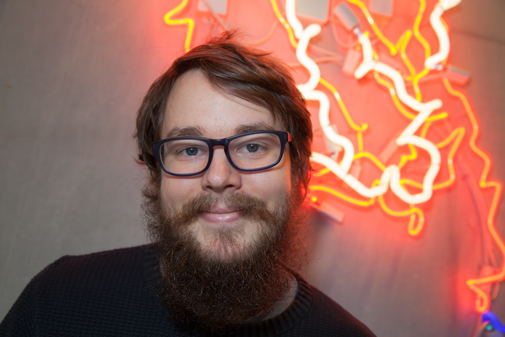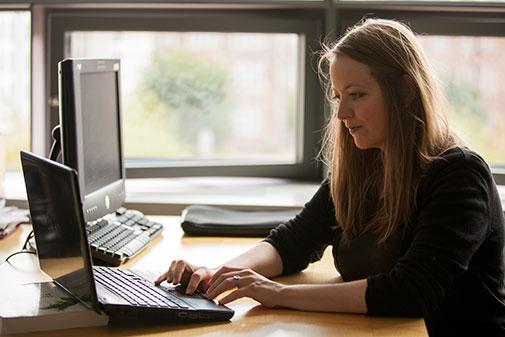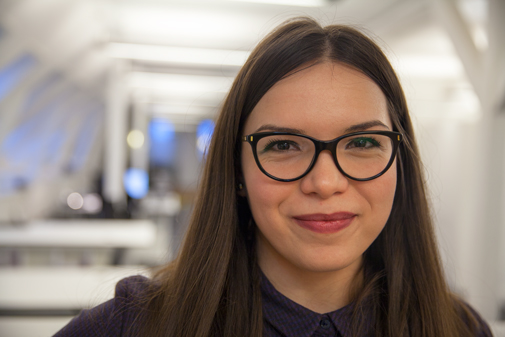Testimonials
Read interviews with students and graduates from the Master of Science programme (MSc) in Bioinformatics.
Christian Ravn initially studied law but didn’t feel at home on the programme at all. Instead he decided to take a completely different direction and do a BSc in Pharmacy. He then started on an MSc in Bioinformatics – a programme that Christian describes as a blend of computer science and biology.

When I applied to study Law, I was after a degree that would bring me prestige and a high salary. But these are completely the wrong reasons for choosing a degree programme.
I was very unmotivated, and felt like law was a very bad fit. Something had to happen, and there’s no point switching to another degree programme unless the change is big enough to make a real difference, so I applied for Bioinformatics.
What is bioinformatics?
You could say it’s about the statistical analysis of large volumes of biological data. For example, when sequencing DNA. When you sequence, you look at how the base pairs are arranged in a DNA strand. This is what defines us genetically.
Sequencing generates a huge amount of information. In Copenhagen alone, 2-3 terabytes of this type of data are produced every day. This corresponds to what you can store on the hard drives of about six standard Mac Books! How do you navigate all this?
This is where biology comes into it, because it’s important to ask the right questions, and biologists are good at that. However, they don’t know much about how to analyse all the data. Computer scientists, on the other hand, are really good at this, so the programme is trying to combine the two disciplines. In other words, it’s mix of computer science – i.e. mathematics and statistics – and biology courses.
What can it be used for?
We can, for example, gain new knowledge about diseases and infections by comparing DNA in large groups of sick and healthy people.
Do you do a lot of mathematics?
Quite a lot, and it can be daunting. But I failed mathematics in upper secondary school, and when I started here I hadn’t done mathematics for nine years, yet I could still keep up. The focus here is not on performing mathematical proofs, but on thinking logically. You learn to program, and that helps you understand mathematical formulas. So people should not be scared by the mathematics.
It’s also possible to do elective subjects with more emphasis on biology. You can basically choose to emphasise the tools – the mathematics and statistics, or learning to ask the right questions – the biology.
It sounds like you spend a lot of time using computers?
The computer is our most important tool each day. We see the computer as a toolbox that you learn to program. This is clearly the most important thing I’ve learned in all my years at university. I don’t understand why everyone doesn’t get taught this during the first year of their degree programme. It makes everything much easier.
What kind of jobs can you get when you are finished?
There are a lot of research-based jobs. The graduates I have spoken to typically work as PhD students or research assistants.
In the private sector, Bioinformatics graduates are typically employed in biotech departments. In Denmark, the medico sector is still only slowly opening up. I think they have been accustomed to pharmacists, who are well educated here in Denmark. But employers are starting to notice this programme, and companies that employ Bioinformatics graduates are happy with them – so the graduates say.
What is your dream job?
I dream of doing a PhD, ideally in Japan. I want to work with machine learning, i.e. programming that makes computers recognise patterns.
An example: you take a group of people with a particular type of cancer and a group without. You sequence their DNA and ask the computer to find the differences between the sick and the healthy. The aim is to teach the machine how to work out whether people are at risk of developing cancer.
What do you think about the study environment?
It’s great, and this was really important for me when I chose the programme. Every other Friday, people can meet up at a study café, where you can get a cup of coffee or a soft drink and play board games. A mix of students, professors and other employees come along, so you can have a chat about how things are going.
The programme involves a lot of group work and cooperation, so you can get good help from your fellow students. I’ve often sat here with other students until around 9:00 or 10:00 in the evening, working on various projects.
Not many students know each other from their bachelor’s programme, so there are no cliques when you start the programme. About 50% are international students, and they are keen to make friends.
Do you have any tips for anyone interested in applying to do Bioinformatics?
Don’t be intimidated by the mathematics and things you don’t know. Let go a little of the expectation that you have to understand everything all the time. Sometimes, you have to accept there are things you don’t understand. Over time you will have regular AHA experiences. Enjoy these AHA moments – they are really fantastic.
After graduation, Christian has worked as a Software Engineer at various companies.
Andra Tolbus completed her MSc degree in Bioinformatics at University of Copenhagen in 2012. Now she is employed at Agnitio, a Danish company offering marketing software for pharmaceutical companies.
Why did you choose bioinformatics?
I was extremely curious about the emerging field of bioinformatics and the increasing volume of biological and experimental data that needed to be mined. The opportunity to get a better understanding of how the human body functions at the molecular level and how it responds to different external factors, by carrying your own analyses, was compelling.
Why did you choose University of Copenhagen?
I discovered University of Copenhagen, the Bioinformatics MSc programme there and the excellent educational rankings. At that point I knew exactly where I wanted to go and was extremely happy when I got accepted for the session starting in 2010.
What was your thesis about – and when did you finish?
My thesis was entitled “Discovery of miR signatures and possible therapeutic targets for the treatment of cardiovascular diseases” there.
In brief, I compared the performance of different statistical methods on mining biological data reflecting the strength of a microRNA molecule in changing gene expression, with a focus on cardiovascular diseases.
Today you are working for Agnitio. What is your job?
At Agnitio, our customers collect data in a marketing campaign – using our software tool – we store and manage it, and then report and analyse it for the Marketing and Brand managers and other interested parties. The new digital marketing materials will be designed in a way that targets the audience better. The end point of using the collected data with our platform is to give the health care professionals a personalised experience when it comes to digital communication.
I am responsible for managing the reporting environment, data modelling and integration, specifying, implementing, and delivering the analytics solutions to our clients. I am also managing a team of junior analysts – students from the IT University of Copenhagen, University of Copenhagen, and Technical University of Denmark studying IT, mathematics, natural language processing and data mining.
Did the education give you the qualifications you need to meet the challenges in your job?
Surely. When I started my master’s, my knowledge in biology, which is crucial for this programme, was quite limited. Thus, besides the quantitative skills and applying analytical methods to real world problems, my education taught me how to learn new skills rapidly and transfer business and academic requirements into working solutions.
On the other hand, I think that there are many other things that you can only learn at the job and no education can make you fully prepared for that.
Was it hard for you to get a job?
I think I have been extremely lucky with finding a job here. I worked as a Bioinformatician at Herlev Hospital and managed to get the job relatively easy three months after graduation.
For my current position, I have been recruited via LinkedIn, while I was still employed at the hospital.
Which kind of jobs can one get?
A few of my colleagues are currently enrolled in PhD programmes, others are doing software development and/or data analysis or have managed to find bioinformatics positions at research centres and are considering doing a PhD after all.
The great thing with bioinformatics is that you acquire a variety of skills which in my opinion increase one’s chances of getting a job, compared to other study programmes.
Any tips for future students?
If you do not have the skills, you should invest energy in courses on scientific communication (writing and speaking). Most of the exams from the science programmes at University of Copenhagen are written scientific reports with oral defence. It is crucial to be able to communicate your results and implications clearly.
And for the international students: Don’t think that you’ll find accommodation as easy as you would in your home country and don’t count on the student accommodation options as the waiting lists are very long. Look for places ahead of time if possible.
When things are so new at many levels, one might feel overwhelmed. The overall experience however, will be totally worth it.
Since this interview, Andra has moved on to become Data Science Manager and Consultant at EY in Denmark (Ernst & Young).
Arriving from Greece to study MSc in Bioinformatics in Copenhagen, Evdoxia Karadoulama found Denmark a strange but quite pleasant place to be.

What’s your background?
I have a bachelor in Mathematics from Aristotele University in Thessaloniki. That’s a four-year study in Greece. I did mostly theoretical maths.
But now you have changed direction. Why?
I was thinking of continuing and doing my master in theoretical maths. But because of the lack of jobs in this area, I looked at other possibilities like economics or statistics.
While I was searching, I started reading about bioinformatics. In Greece it’s not a popular field yet, although they have started up something along the same lines in Athens. I found it very interesting, because it’s a combination of maths, computer science and biology.
Did you have any special interest in biology?
I always had an interest for natural science. I didn’t have a special interest in biology, but I have always wanted to work to improve human health and quality of life. So I found Bioinformatics a good way to achieve this goal.
What exactly does a bioinformatician do?
There’s a big variation in the field. Bioinformaticians can work with the structure of proteins, whole genome analysis, population genetics, ect. To analyse data and create tools for data-analysis – that’s the main thing we do.
So bioinformaticians usually work together with researchers from other fields?
Yes, it’s very common to work with either doctors or labs providing the data and then we have to analyse it and hopefully discover something useful. But Bioinformatics is also about building tools. If you analyse data, you can use already built tools or you can build your own – or both. It depends on your skills, your interests and what you want to do. Actually, I’ve heard recently that a lot of hospitals need bioinformaticians here in Denmark.
What’s your thesis going to be?
Eh, it’s a bit too technical to explain fully, haha. I’m working with RNA and proteins. I am trying to find correlations between specific proteins and some properties of the structure of RNA.
What do you want to do when you finish your master?
I would like to be a researcher. I think it’s an interesting job because you always do something new and have to read and study all the time. Generally, I would prefer to get a job at a university, but I wouldn’t say no to a job in the private sector. Especially here in Denmark I think the private sector is very good. And of course private companies often have more money than the universities, so in that sense it can be more attractive.
What is your experience of the university and studying here?
For me it’s been good. First of all, I didn’t know that you are so informal here. You are on first name terms with the professor. In Greece, you call them Mr. professor and then their surname. You don’t even know their first name. The first day in the class, I heard the Danish students call the professor Anders. I guessed it was some kind of title. It took me some time to understand it was his first name, haha …
The professors are so open. That was a great surprise to me. They get involved in your projects and you can discuss with them. For me, those things were almost unbelievable.
What was it like going from being a bachelor to being a master student?
It was very hard and it required a lot of studying. Before I started my masters here, I didn’t even know how to use a computer properly, except for Facebook, mails and browsing. The difference after a year was very big.
Of course in the first couple of months I was quite lost, because the teaching is in English and my English wasn’t so good. I had only used Greek books in my studies, so it was a big difference. Things here seem to move very fast. Faster than I was used to. Education here is more about critical thinking and not about memorising, so it was quite different compared to what I was used to.
I also didn’t have any experience with oral exams or with group work – so everything was new. But you can always ask help from your fellow students.
One difficulty is that it’s not easy to make friends with the Danes or to approach them. Either I don’t know how to do it or they are not so open. In the master’s programme, it’s mostly the internationals forming a group separate from the Danes. If I could change something here, it would be to make the Danes a bit more open.
In the beginning everything was strange to me, but when you start to understand, it becomes easier. At first I thought the Danes were very rude. But now I understand that this is their way, and they don’t just do it to me – they are also doing it between themselves. A lot of times they say things to you that I wouldn’t say to anyone.
For instance … in the beginning I was always using the elevator. One day I just entered the building and ran because the door of the elevator was almost closing. There was a Danish lady in the elevator who looked at me and said “If you’ve got so much energy to run, you should take the stairs instead.”
I thought it was so rude, but she was only joking. And now I always take the stairs… hahaha …
Evdoxia now holds a PhD from the Institute of Molecular Biology and Genetics at Aarhus University.

